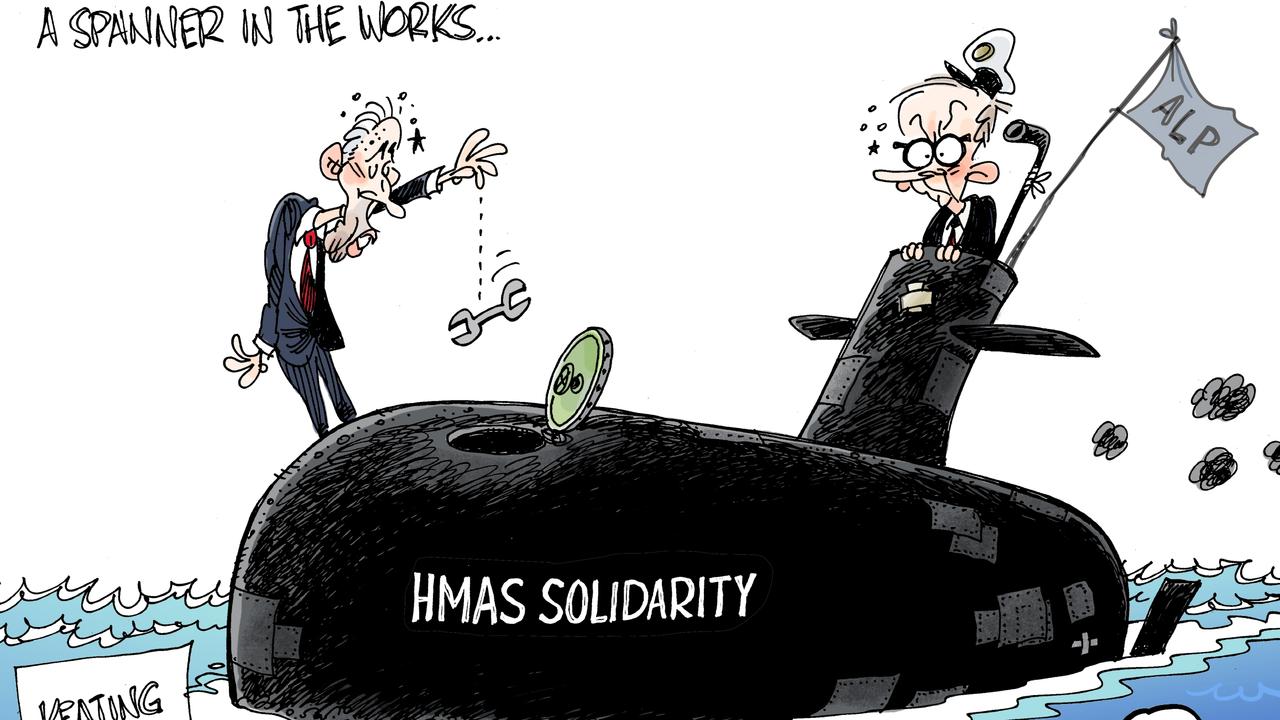Wooley: Sub fleet feat running into big problem
When the major political parties agree with you, your vote is worth pretty much nothing, writes Charles Wooley

I HELD fire in this column last week while everywhere the media was raucous with AUKUS.
Albo called it “a new dawn for Australia’s defence policy” and said it would create 20,000 jobs.
Defence Minister Richard Marles declared that our access to American nuclear subs is “not about a potential war”.
That was confusing.
Was it about deep-sea tourism?
Or oceanographic research?
Why don’t they treat us like grown-ups?
Even Opposition Leader Peter Dutton was onside with the nuclear sub deal, generously offering to support such government budget savings required to fund the massive submarine program.

Though he did not mention cancelling those tax cuts planned for the rich, but who knows?
It was such a fine show of bipartisanship, with the two boys playing nicely in the same bath sharing the same expensive bath toys.
But then Paul Keating surfaced with a ballistic attack on the government’s (approximately) $350bn purchase of those eight nuclear-powered submarines. With characteristic lack of restraint, Keating labelled the purchase the “worst deal in all history”.
Our big new subs wouldn’t even be stealthy. “You can spot them from space,” he raged.
The complexity of our geopolitical strategy (or lack of it) is certainly confusing. If we fear Chinese expansionism to the tune of $350bn, why do they remain our major trading partner?
Are we making money from China so we can afford to protect ourselves from China?
The difficult convolutions of the relationship remind me of when a young researcher told me that the Arab-Israeli confrontation was so complicated she didn’t know “which side to go for”.
At the time I had laughed, saying, “It isn’t a football game.”
But now the joke is on me.

The nuclear sub argument: the more you think on it, the more difficult it is to pick a side.
So last week I sat on the fence.
Were eight shockingly expensive nuclear-powered submarines really better than 40 or 50 conventional ones, which former PM Keating claimed we could get for the same money?
Did we want smaller subs to protect the shallow approaches to the Australian continent, or did we want to go deeper financially and strategically, to lurk unseen in the waters of the South China Sea?
Are we thinking of defensive or offensive? Kokoda or Gallipoli?
Or as an island nation are we only thinking of protecting our vital sea lanes?
But when most of our imports, everything from pharmaceuticals to telecommunications, come from China, what’s to protect?
In Keating’s view, “China is not the Soviet Union”. The nation is involved in international institutions and “would fall over themselves to have a proper relationship with Australia”.
Then, just to further muddy the waters, a fellow former prime minister, Malcolm Turnbull, weighed in on Keating’s side, saying: “If we had gone nuclear with France, we would have had submarines that were much cheaper, delivered sooner, more suitable in terms of size and crew and with reactors that did not create the very dangerous proliferation precedent that will be seized upon by our adversaries.”
But by then the dragon had been well and truly poked.
President Xi closed China’s annual parliamentary session promising to build China’s military into a “great wall of steel”.

Presumably to achieve that, China will buy the necessary iron ore and the coking coal from Australia (they already buy 80 per cent of our iron ore), so it’s not all bad news, so long as you don’t think too hard on it.
Irony aside, our mining trade with China might support Keating’s assertion that the CCP does not want to invade Australia. I have been to other coal- and iron ore-rich places in Africa and South America. The sources are often in the most politically unstable places, with poverty, disease and starvation contributing to armed rebel activity.
You would need to raise a mercenary army to mine in some of those joints.
Meanwhile, in the coal fields and iron ore tenements of Australia the local copper can do the job for next to nothing.
Despite all the perplexing considerations, for many of us the consuming question is how many zeros are there in $350bn?
Are you counting?
(Answer at bottom of column)
All week I have been on the fence and still am. Or as the late Joh
Bjelke-Petersen would have preferred, “with one foot either side of the barbed wire fence”.
Joh was right. It is not a comfortable position. But the truth is, just like you, it does not matter a damn what I think.
The issue is bipartisan, so there’s nothing to vote on at the next election, or the one after that, or the one after that, or the one after that, ad infinitum until the fleet comes in.
In democracies we often disapprove of unnecessarily adversarial politics, but it now occurs that when the major political parties agree, your vote has the same clout as the vote in China.
When we call out human rights abuses, the Chinese government usually warns Australia that “people in glass houses shouldn’t throw stones”.
Going nuclear might well set us up for the same kind of rebuke, not just from China, but from our neighbours.
But in the end if, as we still say in River City, “the ship hits the span”, paying the bill will be the least of our worries.
After nuclear war, all debts will be off. There will be no one around to collect.
(• The answer is 10. Score: Eight to 10, financial genius. Less than eight, politician.)
Charles Wooley is a Tasmanian journalist and deputy mayor of Sorell Council.





